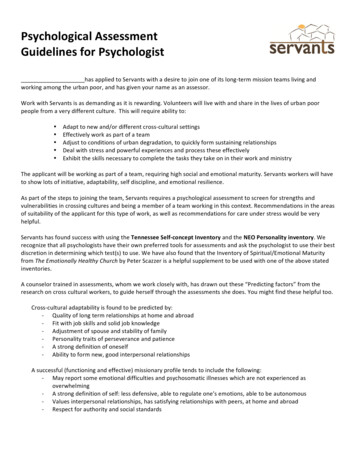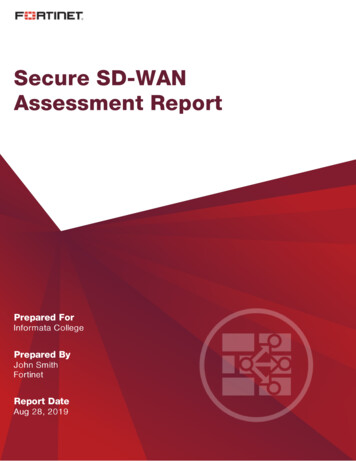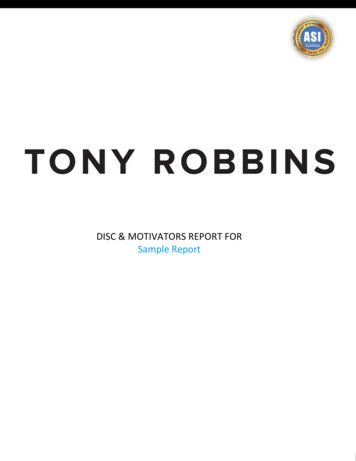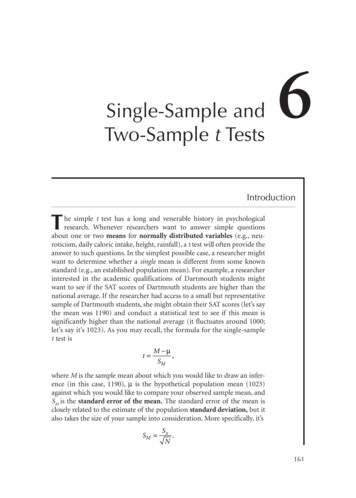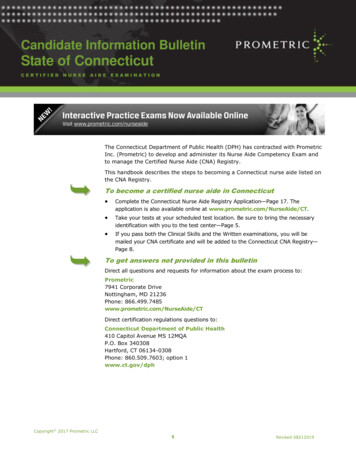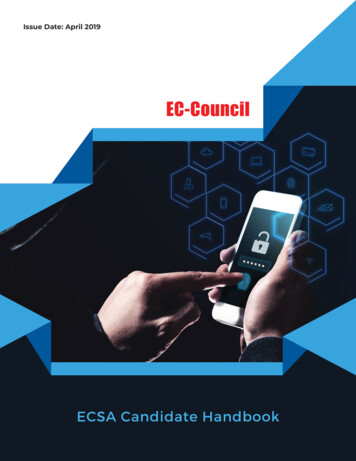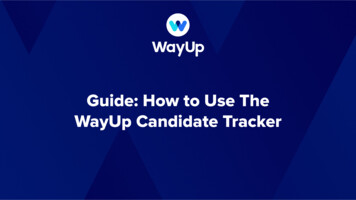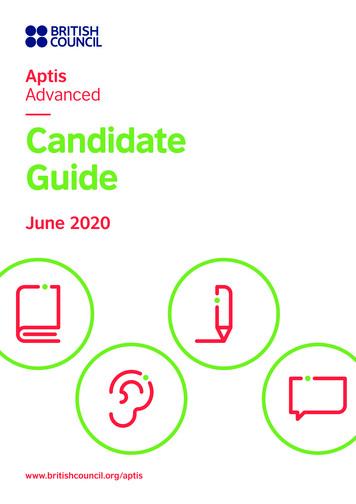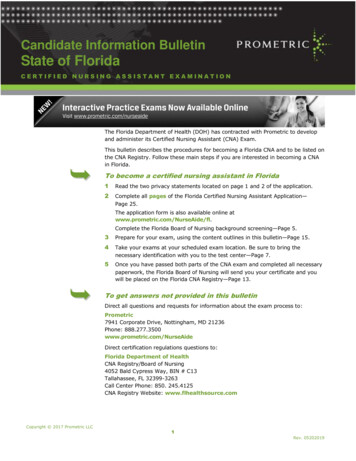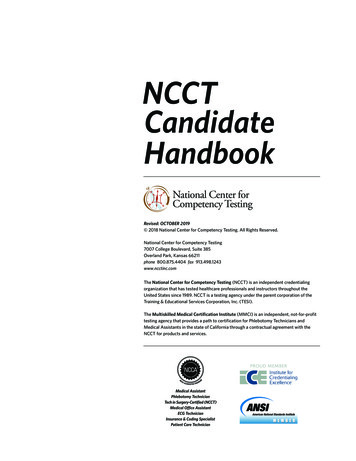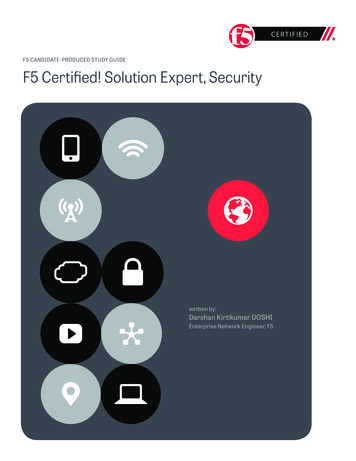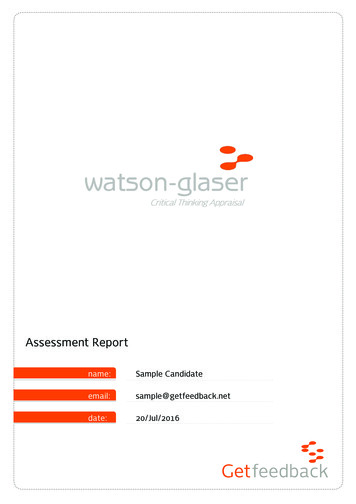
Transcription
Assessment Reportname:name:Sample te:20/Jul/2016
IntroductionThis report provides you with questions that target the key critical thinking skills measured with theWatson-Glaser II. The report offers: an opportunity to confirm the candidate's critical thinking strengths and development areasa tool to reveal how the candidate's critical thinking is likely to appear on the joba consistent structure to ensure a more reliable, valid, and fair interview process.Best Practices for Interviewing and SelectionThis report should not be your only source of interview questions, nor the only criteria used to make aselection decision. Supplement this interview with additional questions tailored to other competencies thatare required to perform the job effectively. Note that interviewing is a skill that requires training and practice.Some tips on how to interview effectively are provided in the Appendix.Using This ReportFor each critical thinking skill (i.e., Recognise Assumptions , Evaluate Arguments , and Draw Conclusions ), twotypes of questions are provided: Standard Interview Questions - These can be asked of thecandidate regardless of their score. Asking the samequestion in every interview enables you to directlycompare responses across all candidates. Score-Based Interview Questions - These are tailored to thecandidate's scores. These enable a more in-depthevaluation of the candidate's response to a situationthey may have found challenging or engaging basedon their critical thinking skills.You can choose from multiple questions for each skill. The questions are followed by additional probes, note-takingspace, and a 5-point rating scale so that you can evaluate the following core elements of each candidate'sresponse: Complexity of the situation in question (more complex situations require stronger critical thinking skills andshould be awarded more points)Effectiveness of the candidate's behaviour (effective critical thinking behaviours should be awarded morepoints)Quality of the direct results of the candidate's behaviour (positive results from the candidate's criticalthinking behaviours should be awarded more points)Regarding the last point, note that you should rate the direct results of the candidate's behaviour (e.g. "We createda stronger, more well-informed project plan."), not broader outcomes he or she may have been unable to influence(e.g. "The project was cancelled after management changed priorities.").namepage 2Sample Candidate Pearson Education Ltd or its affiliate(s). All rights reserved. Adapted by permissionsample@getfeedback.net - 20/Jul/2011www.getfeedback.netAssessment powered by Getfeedback 2011
Recognise Assumptions - Standard Interview QuestionsAssumptions are statements that are assumed to be true in the absence of proof. Identifying them helps to revealinformation gaps and enrich perspectives on an issue. Assumptions can be unstated or directly stated. Being awareof these assumptions and directly assessing their appropriateness to a situation improves the quality andcomprehensiveness of critical thinking.Look for these types of behaviours to determine the effectiveness of the candidate's behaviour: Identifies the assumption(s) that were made. Seeks out and explores different views of the situation from different people or resources. Evaluates how appropriate all assumptions are for the situation (i.e. Will they hold? What if they don't?).Possible Questions: Tell me about a time when. You had to make some assumptions to reach an important decision. You made different assumptions than someone else. Someone challenged an assumption you made.Probe - Situation0No ResponseWhat was the situation? What was your role in this situation?1Very SimpleProbe - Behaviour0No Response3Moderate4Complex5Very ComplexWhat did you do in that situation? What was effective ? What was ineffective?1Very IneffectiveProbe - Results0No y EffectiveWhat were the direct results of your behaviour? How did others impact those results?1Very Negative2Negative3Moderate4Positive5Very PositiveRecognise Assumptions - Standard Interview ScoreTotal Achieved Total number of points (i.e. Situation Behaviour Results)Total Possible Number of points possible based on how many probing areas were discussed (max 15)Note: The Total Score Matrix (p. 9) offers additional guidance on scoring the interview.namepage 3Sample Candidate Pearson Education Ltd or its affiliate(s). All rights reserved. Adapted by permissionsample@getfeedback.net - 20/Jul/2011www.getfeedback.netAssessment powered by Getfeedback 2011
Recognise Assumptions - Score-Based Interview QuestionsAssumptions are statements that are assumed to be true in the absence of proof. Identifying them helps to revealinformation gaps and enrich perspectives on an issue. Assumptions can be unstated or directly stated. Being awareof these assumptions and directly assessing their appropriateness to a situation improves the quality andcomprehensiveness of critical thinking.Look for these types of behaviours to determine the effectiveness of the candidate's behaviour: Identifies the assumption(s) that were made. Seeks out and explores different views of the situation from different people or resources. Evaluates how appropriate all assumptions are for the situation (i.e. Will they hold? What if they don't?).Possible Questions: Tell me about a time when. Someone wanted to take an important action based on unreasonable assumptions. You created a backup plan in case your initial plan was based on assumptions that didn't hold. You identified a risk in someone's plan or strategy.Probe - Situation0No ResponseWhat was the situation? What was your role in this situation?1Very SimpleProbe - Behaviour0No Response3Moderate4Complex5Very ComplexWhat did you do in that situation? What was effective ? What was ineffective?1Very IneffectiveProbe - Results0No y EffectiveWhat were the direct results of your behaviour? How did others impact those results?1Very Negative2Negative3Moderate4Positive5Very PositiveRecognise Assumptions - Score-Based Interview ScoreTotal Achieved Total number of points (i.e. Situation Behaviour Results)Total Possible Number of points possible based on how many probing areas were discussed (max 15)Note: The Total Score Matrix (p. 9) offers additional guidance on scoring the interview.namepage 4Sample Candidate Pearson Education Ltd or its affiliate(s). All rights reserved. Adapted by permissionsample@getfeedback.net - 20/Jul/2011www.getfeedback.netAssessment powered by Getfeedback 2011
Evaluate Arguments - Standard Interview QuestionsArguments are assertions that are intended to persuade someone to believe or act a certain way. Evaluatingarguments is the process of analysing such assertions objectively and accurately. Analysing arguments helpsdetermine whether to believe something or not and how to respond accordingly. Evaluating arguments requires theability to overcome a confirmation bias - the tendency to look for and agree with information that confirms priorbeliefs. Emotion plays a key role in evaluating arguments as well - a high level of emotion can cloud objectivity andthe ability to accurately evaluate arguments.Look for these types of behaviours to determine the effectiveness of the candidate's behaviour: Analyses an argument's reasoning and supporting evidence objectively, accurately, and thoroughly. Reviews the reasoning and evidence for counterarguments, even when doing so is controversial. Keeps own and other people's strong emotions from inappropriately influencing review processes.Possible Questions: Tell me about a time when. You were presented with information intended to persuade you on an important issue. You had to consider information that was opposed to your own views on an issue. You had to evaluate and consider an idea even though it was controversial.Probe - Situation0No ResponseWhat was the situation? What was your role in this situation?1Very SimpleProbe - Behaviour0No Response3Moderate4Complex5Very ComplexWhat did you do in that situation? What was effective ? What was ineffective?1Very IneffectiveProbe - Results0No y EffectiveWhat were the direct results of your behaviour? How did others impact those results?1Very Negative2Negative3Moderate4Positive5Very PositiveEvaluate Arguments - Standard Interview ScoreTotal Achieved Total number of points (i.e. Situation Behaviour Results)Total Possible Number of points possible based on how many probing areas were discussed (max 15)Note: The Total Score Matrix (p. 9) offers additional guidance on scoring the interview.namepage 5Sample Candidate Pearson Education Ltd or its affiliate(s). All rights reserved. Adapted by permissionsample@getfeedback.net - 20/Jul/2011www.getfeedback.netAssessment powered by Getfeedback 2011
Evaluate Arguments - Score-Based Interview QuestionsArguments are assertions that are intended to persuade someone to believe or act a certain way. Evaluatingarguments is the process of analysing such assertions objectively and accurately. Analysing arguments helpsdetermine whether to believe something or not and how to respond accordingly. Evaluating arguments requires theability to overcome a confirmation bias - the tendency to look for and agree with information that confirms priorbeliefs. Emotion plays a key role in evaluating arguments as well - a high level of emotion can cloud objectivity andthe ability to accurately evaluate arguments.Look for these types of behaviours to determine the effectiveness of the candidate's behaviour: Analyses an argument's reasoning and supporting evidence objectively, accurately, and thoroughly. Reviews the reasoning and evidence for counterarguments, even when doing so is controversial. Keeps own and other people's strong emotions from inappropriately influencing review processes.Possible Questions: Tell me about a time when. You recognised that someone was using irrelevant information to make an important decision. You challenged others to evaluate different positions on a controversial issue. Someone tried to persuade you and their argument was based on faulty information.Probe - Situation0No ResponseWhat was the situation? What was your role in this situation?1Very SimpleProbe - Behaviour0No Response3Moderate4Complex5Very ComplexWhat did you do in that situation? What was effective ? What was ineffective?1Very IneffectiveProbe - Results0No y EffectiveWhat were the direct results of your behaviour? How did others impact those results?1Very Negative2Negative3Moderate4Positive5Very PositiveEvaluate Arguments - Score-Based Interview ScoreTotal Achieved Total number of points (i.e. Situation Behaviour Results)Total Possible Number of points possible based on how many probing areas were discussed (max 15)Note: The Total Score Matrix (p. 9) offers additional guidance on scoring the interview.namepage 6Sample Candidate Pearson Education Ltd or its affiliate(s). All rights reserved. Adapted by permissionsample@getfeedback.net - 20/Jul/2011www.getfeedback.netAssessment powered by Getfeedback 2011
Draw Conclusions - Standard Interview QuestionsDrawing conclusions consists of arriving at conclusions that logically follow from the available evidence. It includesevaluating all relevant information before drawing a conclusion, judging the likelihood of different conclusionsbeing correct, selecting the most appropriate conclusion, and avoiding overgeneralising beyond the evidence.Look for these types of behaviours to determine the effectiveness of the candidate's behaviour: Gathers and uses multiple, diverse, high quality sources of information to come to a reasonable conclusion. Draws a conclusion that does not go beyond the supporting evidence, or justifies when doing so. Changes a position or course of action based on relevant and compelling evidence.Possible Questions: Tell me about a time when. You had to make an important decision that would have significant consequences. You had to make an important decision based on limited information. You had to make an important decision and your information suggested multiple approaches.Probe - Situation0No ResponseWhat was the situation? What was your role in this situation?1Very SimpleProbe - Behaviour0No Response3Moderate4Complex5Very ComplexWhat did you do in that situation? What was effective ? What was ineffective?1Very IneffectiveProbe - Results0No y EffectiveWhat were the direct results of your behaviour? How did others impact those results?1Very Negative2Negative3Moderate4Positive5Very PositiveDraw Conclusions - Standard Interview ScoreTotal Achieved Total number of points (i.e. Situation Behaviour Results)Total Possible Number of points possible based on how many probing areas were discussed (max 15)Note: The Total Score Matrix (p. 9) offers additional guidance on scoring the interview.namepage 7Sample Candidate Pearson Education Ltd or its affiliate(s). All rights reserved. Adapted by permissionsample@getfeedback.net - 20/Jul/2011www.getfeedback.netAssessment powered by Getfeedback 2011
Draw Conclusions - Score-Based Interview QuestionsDrawing conclusions consists of arriving at conclusions that logically follow from the available evidence. It includesevaluating all relevant information before drawing a conclusion, judging the likelihood of different conclusionsbeing correct, selecting the most appropriate conclusion, and avoiding overgeneralising beyond the evidence.Look for these types of behaviours to determine the effectiveness of the candidate's behaviour: Gathers and uses multiple, diverse, high quality sources of information to come to a reasonable conclusion. Draws a conclusion that does not go beyond the supporting evidence, or justifies when doing so. Changes a position or course of action based on relevant and compelling evidence.Possible Questions: Tell me about a time when. Someone was making an important decision and they were doing so based on limited information. You thought it was necessary to gather more information before making an important decision. Someone was making an important decision and they misinterpreted the information guiding that decision.Probe - Situation0No ResponseWhat was the situation? What was your role in this situation?1Very SimpleProbe - Behaviour0No Response3Moderate4Complex5Very ComplexWhat did you do in that situation? What was effective ? What was ineffective?1Very IneffectiveProbe - Results0No y EffectiveWhat were the direct results of your behaviour? How did others impact those results?1Very Negative2Negative3Moderate4Positive5Very PositiveDraw Conclusions - Score-Based Interview ScoreTotal Achieved Total number of points (i.e. Situation Behaviour Results)Total Possible Number of points possible based on how many probing areas were discussed (max 15)Note: The Total Score Matrix (p. 9) offers additional guidance on scoring the interview.namepage 8Sample Candidate Pearson Education Ltd or its affiliate(s). All rights reserved. Adapted by permissionsample@getfeedback.net - 20/Jul/2011www.getfeedback.netAssessment powered by Getfeedback 2011
Total Score MatrixPart ITransfer the Total Standard Question Scores and Total Score-Based Question Scores from pages 3-8 to the designatedspaces below. If a probing area was not covered then adjust the Possible points so that the candidate is not unfairlypenalised.Part IIAdd the Total Achieved points and Total Possible points from all three areas above and transfer them to the designatedspaces below. To calculate the Total Interview Score, divide the Total Achieved points by the Total Possible points andthen multiply the result by 100 to get the score as a percentage.Overall Commmentsnamepage 9Sample Candidate Pearson Education Ltd or its affiliate(s). All rights reserved. Adapted by permissionsample@getfeedback.net - 20/Jul/2011www.getfeedback.netAssessment powered by Getfeedback 2011
Appendix - Best Practices for InterviewingPreparation Familiarise yourself with the questions and rating scales to be used for the interview. Review any otherpertinent information about the candidate. This will help you to avoid unnecessary questions.Choose a setting for the interview that is free from distractions. Interruptions can send a message to thecandidate that the interview is not important and may promote feelings of unfair treatment.Plan the order in which you will conduct the interview (e.g. 1. Introduction, 2. Interview questions, 3.Candidate questions, 4. Closing).Introduction Greet the applicant and introduce yourself with a brief description of your role and history with theorganisation. Take a few minutes to build a good rapport with the candidate to put them at ease.However, avoid excessive "small talk" or personal interaction that might bias your decision making.Explain the purpose of the interview, the types of questions you will ask and that you will be taking notes.Let the candidate know that there will be time at the end for his or her questions.Conducting the InterviewYour behaviour during the interview will influence the candidate's comfort level, his or her openness and honestyand the overall success of the interview. Demonstrate your interest through appropriate eye contact, a pleasantdemeanour, an attentive posture, and verbal assurances to make the candidate feel relaxed and positive about theinterview experience.If necessary, make the transition between other sections of the interview and the Watson-Glaser II Interview Reportby explaining that you will be shifting to a different competency or style of questioning. You may also find it helpfulto provide some role-specific context for each interview question as a lead-in. For example, you might start, "Ourmanagers are required to make high stakes decisions each day. Tell me about a time when." If you do this, makesure your lead-ins are consistent across interviews.As the candidate responds to your questions, listen for details that will help you rate the situations, behaviours andresults that he or she describes. Use the probing questions provided to gather any missing information. Takethorough notes that will allow you to accurately recall and objectively score the candidate's responses.Closing the Interview Provide adequate time for the candidate to ask questions.Thank the candidate for his or her time.Explain the next steps in the selection process.Legal and Ethical ConsiderationsEnsure that all interview questions are job-related by linking the questions asked to the job's core competencies.This applies to the questions contained in this report and any additional questions that you ask in the interview.Avoid asking questions related to a candidate's ethnicity, gender, religion, national origin, age, or disability status.For more information on legal issues and ethical considerations, please consult the Equality Act 2010(www.legislation.gov.uk).namepage 10Sample Candidate Pearson Education Ltd or its affiliate(s). All rights reserved. Adapted by permissionsample@getfeedback.net - 20/Jul/2011www.getfeedback.netAssessment powered by Getfeedback 2011
Watson-Glaser II. The report offers: an opportunity to confirm the candidate's critical thinking strengths and development areas a tool to reveal how the candidate's critical thinking is likely to appear on the job a consistent structure to e
